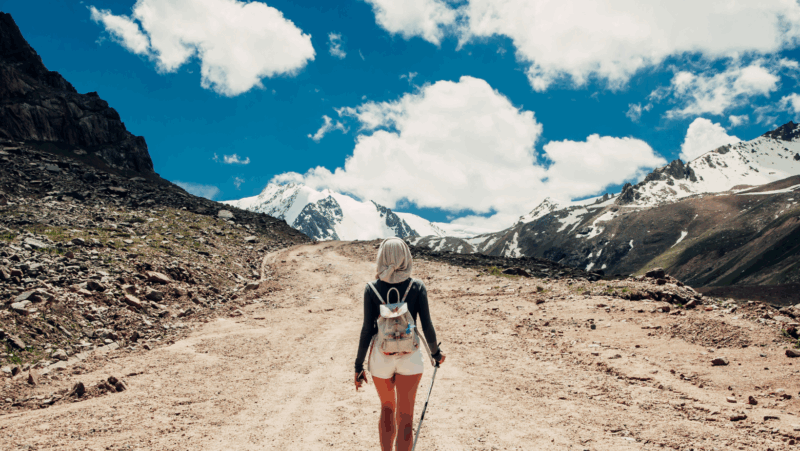Hiking is a wonderful way for older women to stay active, enjoy nature, and boost overall wellness. As the body changes with age, supporting energy levels and maintaining strength becomes even more important. One helpful way to do this is by incorporating revitalizing menopause vitamins, such as MENO menopause supplements, into your daily routine, which can assist with balancing hormones and improving stamina.
With thoughtful preparation and the right habits, hiking can remain a safe and enjoyable activity that improves both physical health and mental clarity. Here are six best practices to help older women make the most of every hike.
Table of Contents
Toggle1. Prioritize Joint and Bone Health
Maintaining strong joints and bones is essential for hiking comfortably and preventing injuries. Regular low-impact exercises like swimming or yoga can improve flexibility and strengthen muscles that support the joints.
Additionally, incorporating calcium and vitamin D through diet or supplements helps keep bones resilient. Before hitting the trail, gentle warm-up stretches prepare the body by increasing blood flow and reducing stiffness. Paying attention to joint health guarantees that hikes remain enjoyable without discomfort or strain.
2. Choose the Right Footwear
Proper footwear plays a critical role in hiking safety and comfort. Older women should look for hiking shoes or boots that provide excellent arch support, cushioning, and traction. These features help absorb shock and maintain balance on uneven terrain.
Selecting footwear that fits well is important to prevent blisters and foot fatigue. Breaking in new shoes gradually before tackling long hikes ensures they mold to the feet and avoid discomfort during the outing. Investing in quality hiking shoes pays off with greater stability and endurance on the trail.
3. Stay Hydrated and Nourished
Hydration becomes increasingly important with age because the body’s natural thirst signals may not be as strong. Carrying enough water and drinking regularly throughout the hike prevents dehydration, which can cause fatigue and dizziness.
Nutritious snacks like nuts, dried fruit, or whole-grain bars provide steady energy without causing stomach upset. Planning out water sources along the trail or bringing a portable water filter can make longer hikes easier and safer. Proper hydration and nutrition keep energy levels steady and help maintain focus during outdoor adventures.
4. Dress for Comfort and Safety
Choosing the right clothing can make a big difference in comfort and protection while hiking. Lightweight, moisture-wicking fabrics help keep the skin dry and prevent overheating.
Layering is key. For the base layer of your hiking gear, start with a breathable layer and then add a jacket or fleece that allows for easy adjustment to changing temperatures. Wearing a wide-brimmed hat and applying sunscreen protects against sun exposure, which becomes more critical with age. Don’t forget sturdy hiking socks to prevent blisters and keep feet comfortable on long walks.
5. Plan and Pace Yourself
Older women benefit from thoughtful planning and pacing during hikes. Selecting trails that match current fitness levels avoids overexertion and reduces injury risk. It’s important to start slowly and take regular breaks to catch your breath and hydrate.

Listening to the body’s signals and not pushing too hard can make hiking more enjoyable and sustainable. Using trekking poles can also help reduce strain on knees and provide added stability on uneven terrain.
6. Stay Connected and Prepared
Safety is a top priority for any hiker, especially when hiking alone or in remote areas. Carrying a fully charged phone, GPS device, or personal locator beacon can provide peace of mind. Letting someone know your hiking route and expected return time is a smart precaution.
Packing essentials such as a first-aid kit, map, flashlight, and extra layers prepares you for unexpected situations. Staying connected and prepared ensures a safer hiking experience and allows for quick assistance if needed.
7. Focus on Nutrition and Recovery
Proper nutrition before, during, and after hiking is vital in maintaining energy and aiding recovery. Older women should fuel up with balanced meals rich in protein, healthy fats, and complex carbohydrates to sustain endurance.
During the hike, carrying easy-to-digest snacks like nuts, dried fruit, or energy bars helps maintain blood sugar levels. After the hike, prioritizing hydration and consuming foods with antioxidants and anti-inflammatory properties can reduce muscle soreness and support overall wellness. Integrating menopause vitamins into a daily routine may also enhance energy and joint health to support an active hiking lifestyle.
Elevate Your Hiking Experience
By following these best practices, older women can enjoy hiking safely and comfortably while reaping its physical and mental health benefits. Careful preparation, listening to the body, and maintaining proper nutrition will help make every hike a positive and empowering experience. With the right mindset and tools, the trails become a path to wellness and adventure at any age.






